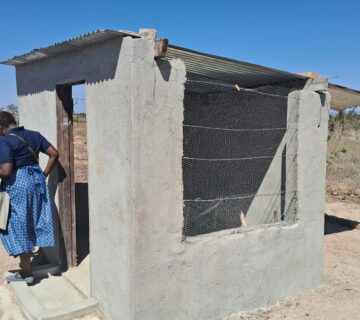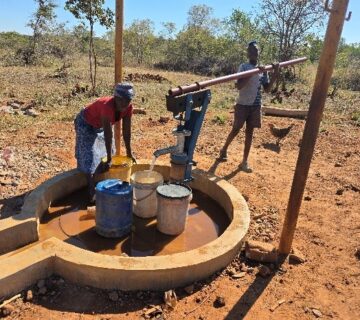As empowerment came by.
Tsungai, which is a USAID-BHA funded Activity is being implemented through Linkages for Economic Advancement for the Disadvantaged (LEAD) and GOAL. Tsungai Activity in Gutu District, Masvingo Province in Zimbabwe. Tsungai aims to enhance the resilience and food security of vulnerable households through integrated interventions in the food production and WASH sectors. Tsungai facilitated the empowerment of youth, who are now providing basin digging services for land preparation in the community.
With a strong desire to embrace modern a techniques, Mr. Nyasha Madzimure, a 27-year-old male, seized the opportunity to receive training and acquire a basin digger to offer local farmers basin digging. Nyasha is thrilled with his new responsibility, which has kept him busy this season.
Having never engaged in paid work before, Nyasha is grateful for the provided to him. This opportunity has transformed his social dynamics both at home and within the community, instilling balanced family values as he gains economic empowerment. His role as a service provider has positively impacted his social status, earning him the respect from his peers.
Farmers who have benefited from Nyasha’s basin digging service expressed their gratitude for the mechanized assistance, noting that it is significantly less time-consuming. The basins created with the digger are also healthier than those made with traditional hoes. Mechanized basin digging has proven to be an efficient solution to labour-intensive ploughing. “If it weren’t for the poor rains, our farmers would have had a much better harvest this season,” Nyasha reflected with a hint of concern. “We have the drive and determination to farm “shungu tinadzo” but nature hasn’t been kind to us.”
Like any other business, Nyasha business has faced its fair share of challenges, but he is not giving up. “The dryness of the land has posed a significant learning curve for me, getting to learn the dynamics of labour time on varying soil conditions”. He pointed out that, “the drier the land the more fuel consumed as it takes longer to drill a single hole”. As a result, he is actively learning strategic methods to make his work more efficient.
Nyasha currently offers an average of four farmers a day, charging a minimum of USD10 for his services other charges vary depending on the size of the field requiring service. For him, it is not just about income but also about contributing to the community’s resilience. “If we are to get a reliable water source, I wish farmers could come together for cooperative farming, especially in horticulture. With the support of mechanized agriculture tools we can overcome food security challenges,” he suggested passionately.



No comment